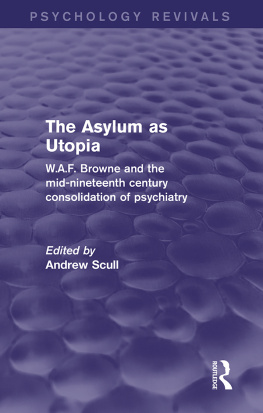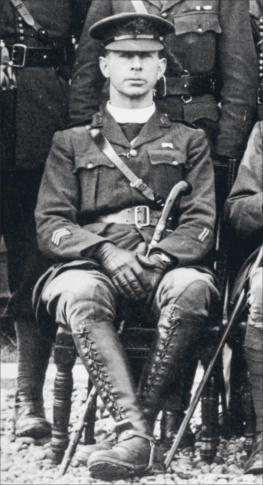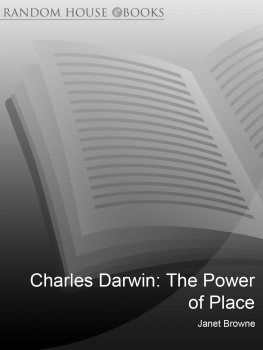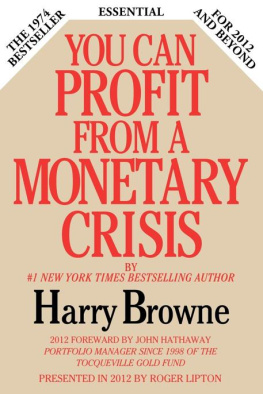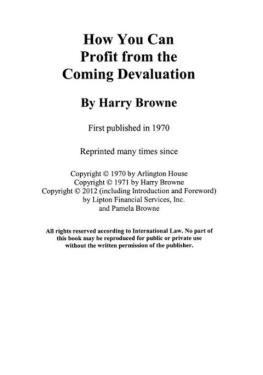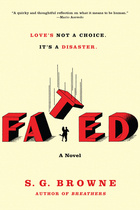Psychology Revivals
The Asylum as Utopia
What Asylums Were, Are, and Ought to Be, first published in 1837, was of considerable significance in the history of lunacy reform in Britain. It contains perhaps the single most influential portrait by a medical author of the horrors of the traditional madhouse system. Its powerful and ideologically resonant description of the contrasting virtues of the reformed asylum, a hive of therapeutic activity under the benevolent but autocratic guidance and control of its medical superintendent, provided within a brief compass a strikingly attractive alternative vision of an apparently attainable utopia. Brownes book thus provided important impetus to the efforts then under way to make the provision of county asylums compulsory, and towards the institution of a national system of asylum inspection and supervision.
This edition, originally published in 1991 as part of the Tavistock, Classics in the History of Psychiatry series, contains a lengthy introductory essay by Andrew Scull. Scull discusses the social context within which What Asylums Were, Are, and Ought to Be came to be written, examines the impact of the book on the progress of lunacy reform, and places its authors career in the larger framework of the development of Victorian psychiatry as an organised profession. Through an examination of Brownes tenure as superintendent of the Crichton Royal Asylum in Dumfries, Scull compares the theory and practice of asylum care in the moral treatment era, revealing the remorseless processes through which such philanthropic foundations degenerated into more or less well-tended cemeteries for the still-breathing institutions almost startlingly remote from Brownes earlier visions of what they ought to be.
The Asylum as Utopia
W.A.F. Browne and the mid-nineteenth century consolidation of psychiatry
Edited with an introduction by
Andrew Scull

First published in 1991
by Routledge
This edition first published in 2014 by Routledge
27 Church Road, Hove, BN3 2FA
Simultaneously published in the USA and Canada
by Routledge
711 Third Avenue, New York, NY 10017
Routledge is an imprint of the Taylor & Francis Group, an informa business
1991 Introduction by Andrew Scull
All rights reserved. No part of this book may be reprinted or reproduced or utilised in any form or by any electronic, mechanical, or other means, now known or hereafter invented, including photocopying and recording, or in any information storage or retrieval system, without permission in writing from the publishers.
Publishers Note
The publisher has gone to great lengths to ensure the quality of this reprint but points out that some imperfections in the original copies may be apparent.
Disclaimer
The publisher has made every effort to trace copyright holders and welcomes correspondence from those they have been unable to contact.
A Library of Congress record exists under ISBN: 0415017262
ISBN: 978-0-415-73060-0 (hbk)
ISBN: 978-1-315-85012-2 (ebk)
THE ASYLUM AS UTOPIA
W. A. F. Browne and the Mid-Nineteenth Century Consolidation of Psychiatry
Edited with an Introduction by
Andrew Scull

First published in 1991
by Routledge
11 New Fetter Lane, London EC4P 4EE
Simultaneously published in the USA and Canada
by Routledge
a division of Routledge, Chapman and Hall Inc.
29 West 35th Street, New York, NY 10001
1991 Introduction by Andrew Scull
Printed in Great Britain by Antony Rowe Ltd
All rights reserved. No part of this book may be reprinted or reproduced or utilized in any form or by any electronic, mechanical, or other means, now known or hereafter invented, including photocopying and recording, or in any information storage or retrieval system, without permission in writing from the publishers.
British Library Cataloguing in Publication Data
Browne, William Alexander Francis
[What asylums were, are, and ought to be] The Asylum as Utopia: W. A. F. Browne and the mid-nineteenth century consolidation of psychiatry. (Tavistock classics in the history of psychiatry)
1. Great Britain. Psychiatric hospitals
[What asylums were, are, and ought to be] I. Title II. Scull, Andrew 1947 III. Series
362.210941
Library of Congress Cataloging in Publication Data
Browne, W. A. F. (William Alexander Francis), 18061885.
[What asylums were, are, and ought to be]
The asylum as Utopia: W. A. F. Browne and the mid-nineteenth century consolidation of psychiatry / edited by Andrew Scull.
p. cm. (Tavistock classics in the history of psychiatry)
Reprint. Originally published: What asylums were, are, and ought to be. Edinburgh: A. & C. Black, 1837.
Includes bibliographical references.
1. Psychiatric hospitals. 2. PsychiatryEarly works to 1900.
I. Scull, Andrew T. II. Title. III. Series.
RC439.B88 1991 | 90-8448 |
362.21dc20 | CIP |
ISBN 0-415-01726-2
Andrew Scull
The education of an alienist
The public reception of What Asylums Were, Are, and Ought to Be, and the extraordinarily successful career of its author, a previously obscure if ambitious provincial surgeon and mad-doctor, are intimately bound up with the progress of the nineteenth century lunacy reform movement and consolidation of the newly emerging profession of alienism in Scotland and England. Book and author made notable contributions to both these developments, and the importance of the text which follows can only be understood when it is placed in this larger context.
Between the publication of his first and only book in 1837, and his retirement as the first Scottish Lunacy Commissioner in 1870, William Alexander Francis Browne occupied a position among Scottish alienists that was every bit as dominant as that of his English counterpart, John Conolly, It is his contributions in precisely these directions that account for Brownes prominence among Scottish alienists, and for the extension of his fame and influence beyond his native land.
We should not be surprised by this state of affairs. Notwithstanding the long history of medical speculations about the causes and cure of insanity, and the involvement of some segments of the medical profession in the eighteenth century trade in lunacy, medical armamentarium, had richly earned the gratitude of their alienist contemporaries; and quite properly are accorded a central place of honour by those historians who equate the rise of psychiatry with the advance of science and humanity.
The striking similarities in the underlying sources of the prominence achieved by Browne and Conolly in their mature years find a curious echo in the circumstances of their early biographies. Browne was born into a precariously genteel family in Stirling, central Scotland, on June 24, 1805. Within a few weeks of his birth, his father, an army officer en route to join Wellingtons troops in fighting the Peninsular War, was drowned when his troop transport was wrecked and sank on the Goodwin Sands. William was thus left to be brought up in his maternal grandparents house, receiving a meagre education at the local high school and facing uncertain prospects for retaining his middle-class status. Conolly, some eleven years his senior, came from a not dissimilar social background (his father being the younger son of an impecunious minor branch of the Irish gentry), and he, too, was orphaned at a very early age. In Conollys case, it was his mothers remarriage which led to his being farmed out at the age of five to live with relatives in the provincial backwater of Hedon in the East Riding, where, as he remarked bitterly later in life, he received a dull, mechanical and hopelessly inadequate education at the local grammar school. After dabbling in a military career and finding his prospects in this direction foreclosed by Napoleons defeat, Conollys own fecklessness, and his possession of a small inheritance, allowed him to contract an unwise marriage and to spend two years in idleness, before the frittering away of his capital forced him to seek some stable source of income.
Next page
